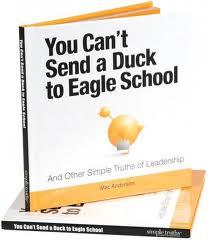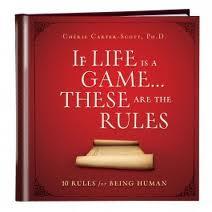 A story from You Can’t Send a Duck to Eagle School by Mac Anderson
A story from You Can’t Send a Duck to Eagle School by Mac AndersonTo build a “customer first” culture, you must put them second. Your employees must come first, because there is a rule of thumb in business that says, “Your people will only treat your customers as well as they are being treated; thus to have satisfied customers, they must be served by passionate people.”
Howard Schultz, the founder of Starbucks, is one of my favorite leaders. His book, Pour Your Heart Into It, is excellent. In it he offers in great detail all the obstacles he overcame in turning his vision into reality.
Early on, Schultz realized that the key to his success was to recruit well-educated people who were eager to communicate his passion for coffee. This, he felt, would be his competitive advantage in an industry where turnover was 300 percent a year. To hire the best people, he also knew he must be willing to pay them more than the going wage and offer health benefits that weren’t available elsewhere. He saw that part-time people made up two-thirds of his employee base, and no one in the restaurant industry offered benefits to part-timers.
Schultz went to work in an effort to sell his board of directors on increasing expenses while most restaurant executives in the 1980’s were looking for ways to cut costs. Initially, Schultz’s pleas to investors and the board fell on deaf ears because Starbucks was still losing money. But Schultz was persistent. He was looking long term and was committed to growing the business with passionate people. He won, and said many times afterwards that this decision was one of the most important decisions, if not the most important, that he made at Starbucks. His employee retention rate was about five times the industry average, but more importantly, he attracted people with great attitudes who made their customers feel welcome and at home.
Over the years, Schultz often showed how much he cared for his people. Early on July 7, 1997, he and his family were asleep at home in East Hampton, New York. The phone rang and he learned that three Starbucks employees had been murdered in a botched robbery in Washington, D.C. A stunned Schultz immediately chartered a plane and arrived there before 9 a.m. that morning. He stayed for a week working with the police, meeting with the victims’ families, and attending funerals. He ultimately decided that the future profits of the store would go to organizations working for violence prevention and victims’ rights.
Howard Schultz “gets it.” A common quote of the Starbucks team tells it all:
“We aren’t in the coffee business serving people. We’re in the people business serving coffee.”
To learn more about You Can’t Send a Duck to Eagle School, please click here!
Reprinted by permission of Simple Truths (c) 2011. In order to protect the rights of the copyright holder, no portion of this publication may be reproduced without prior written consent. All rights reserved.

